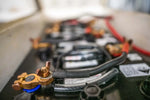
Power Up: A Comprehensive Guide to Choosing the Right Batteries for Your Boat
, by Safe Water Team, 3 min reading time

, by Safe Water Team, 3 min reading time
When it comes to powering your boat's electrical systems, choosing the right batteries is essential for ensuring reliable performance and peace of mind on the water. From starting the engine to running onboard electronics and accessories, batteries play a crucial role in keeping your boat running smoothly. In this guide, we'll explore the factors to consider when selecting batteries for your boat and provide tips for making the best choice to suit your needs.
Starting Batteries: Designed to deliver high bursts of power to start the engine, starting batteries are essential for reliable engine ignition. They are optimized for quick energy release and have fewer deep discharge cycles compared to other types of batteries.
Deep Cycle Batteries: Ideal for powering onboard electronics, lights, and accessories, deep cycle batteries are designed to provide a steady flow of power over an extended period. They are capable of withstanding repeated deep discharges without sustaining damage, making them well-suited for marine applications.
Dual-Purpose Batteries: As the name suggests, dual-purpose batteries combine the characteristics of starting and deep cycle batteries, making them versatile options for boats with moderate power demands. While they may not excel in either application compared to dedicated starting or deep cycle batteries, they offer a convenient all-in-one solution for certain boating needs.
Battery Size and Capacity: Determine the size and capacity of batteries required based on your boat's electrical needs, engine size, and usage patterns. Consider factors such as cranking amps (CCA) for starting batteries and amp-hour (Ah) rating for deep cycle batteries to ensure adequate power output and runtime.
Battery Chemistry: Choose between flooded lead-acid, AGM (absorbent glass mat), or gel batteries based on your preferences, budget, and specific application requirements. Each type of battery has its advantages and disadvantages in terms of performance, maintenance, and lifespan.
Mounting and Space Constraints: Consider the physical dimensions and weight of batteries to ensure compatibility with your boat's available space and mounting locations. Opt for compact, lightweight batteries if space is limited or if weight distribution is a concern.
Maintenance Requirements: Evaluate the maintenance requirements of different battery types, including topping up electrolyte levels, checking water levels, and ensuring proper ventilation. AGM and gel batteries are maintenance-free and may be preferable for boaters seeking convenience and ease of use.
Durability and Longevity: Look for batteries with durable construction, corrosion-resistant terminals, and robust internal components to withstand the rigors of marine environments and prolong battery lifespan. Choose reputable brands known for producing high-quality marine batteries with reliable performance and warranties.
Proper Charging: Use a marine-grade battery charger or onboard charging system to maintain batteries at optimal charge levels and prevent overcharging or undercharging. Follow manufacturer recommendations for charging protocols and voltage settings.
Regular Inspection: Periodically inspect batteries for signs of damage, corrosion, or leakage, and address any issues promptly to prevent damage to electrical components and ensure safety on board.
Equalization and Conditioning: Perform periodic equalization or conditioning cycles on flooded lead-acid batteries to balance cell voltages, remove sulfation, and prolong battery life. Follow manufacturer guidelines and safety precautions when performing maintenance procedures.
Storage Considerations: Store batteries in a cool, dry location away from direct sunlight and extreme temperatures when not in use. Consider removing batteries from the boat during extended periods of storage to prevent self-discharge and maintain charge levels.
Choosing the right batteries for your boat is a critical decision that can impact your vessel's performance, reliability, and safety on the water. By considering factors such as battery type, size, capacity, maintenance requirements, and longevity, you can select batteries that meet your specific needs and preferences. With proper care and maintenance, high-quality marine batteries can provide years of dependable power for all your boating adventures.